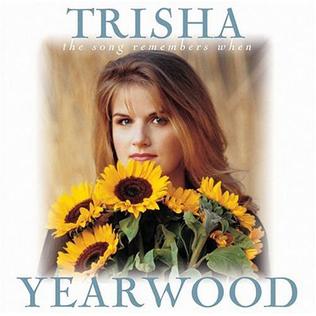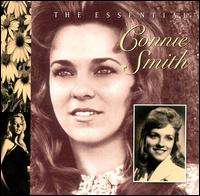
John Marty Stuart is an American country and bluegrass music singer, songwriter, and musician. Active since 1968, Stuart initially toured with Lester Flatt, and then in Johnny Cash's road band before beginning work as a solo artist in the early 1980s. He is known for his combination of rockabilly, country rock, and bluegrass music influences, his frequent collaborations and cover songs, and his distinctive stage dress.

Connie Smith is an American country music singer and songwriter. Her contralto vocals have been described by music writers as significant and influential to the women of country music. A similarity has been noted between her vocal style and the stylings of country vocalist Patsy Cline. Other performers have cited Smith as influence on their own singing styles, which has been reflected in quotes and interviews over the years.

Kathleen Alice Mattea is an American country music and bluegrass singer. Active since 1984 as a recording artist, she has charted more than 30 singles on the Billboard Hot Country Songs charts, including four that reached No. 1: "Goin' Gone", "Eighteen Wheels and a Dozen Roses", "Come from the Heart", and "Burnin' Old Memories", plus 12 more that charted within the top ten. She has released 14 studio albums, two Christmas albums, and one greatest hits album. Most of her material was recorded for Universal Music Group Nashville's Mercury Records Nashville 8division between 1984 and 2000, with later albums being issued on Narada Productions, her own Captain Potato label, and Sugar Hill Records. Among her albums, she has received five gold certifications and one platinum certification from the Recording Industry Association of America (RIAA). She has collaborated with Dolly Parton, Michael McDonald, Tim O'Brien, and her husband, Jon Vezner. Mattea is also a two-time Grammy Award winner: in 1990 for "Where've You Been", and in 1993 for her Christmas album Good News. Her style is defined by traditional country, bluegrass, folk, and Celtic music influences.

Reba: Duets is the twenty-sixth studio album by American country music singer Reba McEntire. It was released on September 18, 2007, by MCA Nashville and was produced by Tony Brown, Dann Huff, McEntire, and Justin Timberlake.

The Song Remembers When is the third studio album by American country music artist Trisha Yearwood. The album was released October 26, 1993, on MCA Nashville Records and was produced by Garth Fundis. It was Yearwood's third collaboration with Fundis, who also produced her 1992 album, Hearts in Armor which received wide critical acclaim, as well as her platinum-selling eponymous debut. The title track was the album's lead single, becoming a major hit, peaking at #2 on the Hot Country Singles & Tracks chart in 1993.

Connie Smith is the debut studio album by American country music artist Connie Smith. It was released in March 1965 by RCA Victor and was produced by Bob Ferguson. The album included Smith's debut single, "Once a Day". The song became her signature recording and biggest hit, reaching number one on the Billboard country songs chart.

Soul of Country Music is the ninth studio album by American country singer Connie Smith. It was released in December 1967 by RCA Victor and contained 12 tracks. The album included mostly covers of previously-recorded songs. It received mixed reviews from critics following its release and reached the top ten of the American country albums chart.

Sunshine and Rain is the eleventh studio album by American country singer Connie Smith, released in October 1968 by RCA Victor. Sunshine and Rain featured an assortment of both new material and covers of songs by other country artists. The album reached the top 40 of the American country albums chart and received a favorable review from Billboard magazine following its release.

Connie's Country is the twelfth studio album by American country singer Connie Smith, released in April 1969 by RCA Victor. The pop-inspired project included a mixture of original and cover songs. The album 'Connie's Country' was a hit, with a cover of Gordon Lightfoot's 'Ribbon of Darkness' reaching the top 20 on the American country songs chart. The album itself was also successful, placing in the top 20 on the American country albums chart. Critics praised the album for its quality and song selection.

Come Along and Walk with Me is seventeenth solo studio album by American country singer Connie Smith, released in October 1971 by RCA Victor. The album was Smith’s third collection of gospel songs. The disc included original songs and covers of songs first cut by other artists. Among the song included on the project were three by gospel performer Dottie Rambo. Following its release, Billboard gave the album a positive review.

Ain't We Havin' Us a Good Time is the eighteenth solo studio album by American country singer Connie Smith, released in April 1972 by RCA Victor. The album contained ten tracks which were considered to have a "thicker seventies" sound, according to one biographer. Included on the album was Smith's single, "Just for What I Am". It became a top five single on the North American country songs chart while the album itself reached the American country LP's top 25. Ain't We Havin' Us a Good Time received a favorable review from Billboard magazine following its release.

A Lady Named Smith is the twentieth solo studio album by American country singer Connie Smith. It was released in May 1973 by Columbia Records, her first album for the label. The production and style featured a string instrumentation to help market Smith in the pop field. Included were a mix of new material and covers of previously-recorded songs by other artists. The album's only single was the original tune, "You've Got Me ", which reached the American country songs chart in 1973. A Lady Named Smith would also chart on the American country albums chart in 1973.

Pure Connie Smith is the twenty-ninth solo studio album by American country singer Connie Smith. It was released in November 1977 via Monument Records and contained ten tracks. The album was Smith's first with the Monument label. The album was recorded in a country pop production style featuring mostly new recordings. One single was released from the album, "Coming Around". The song charted the American country songs chart in 1977.

The Essential Connie Smith is a compilation album by the American country artist Connie Smith. It was released in April 1996 by RCA Records and was produced by Bob Ferguson and Ethel Gabriel. The album is a collection of Smith's major hits between 1964 and 1972.

The albums discography of Connie Smith, an American country artist, consists of 40 studio albums, one live album, 14 compilation albums, three box sets, and 26 other appearances. After the success of her 1964 single "Once a Day", Smith's self-titled debut album was released in March 1965 on RCA Victor Records. The album reached number one on the Billboard Top Country Albums, spending thirty weeks on the chart, while also becoming her only album to reach the Billboard 200 list (#105). Smith's next two secular albums, Cute 'n' Country and Miss Smith Goes to Nashville went to number one and number two respectively between 1965 and 1966. In September 1966 Smith released her fifth studio album, Born to Sing, which was her third album to reach the top spot on the Billboard country albums chart. Due to Smith's popularity, RCA Victor issued five albums between 1967 and 1968 including Downtown Country (1967), Connie Smith Sings Bill Anderson (1967), and I Love Charley Brown (1968). In 1969, Smith collaborated with country artist Nat Stuckey on the album Young Love.

Written In Song is the sixteenth studio album by American country artist Jeannie Seely. It was released on January 13, 2017 on Cheyenne Records and was produced by Seely. It is her first studio release in six years and the second to be issued on her own label. The album consisted of songs Seely composed for other artists. There are also several songs included that had not been released before.

Fine Wine is a studio album by American country singer-songwriter Bill Anderson. It was released on August 25, 1998, via Warner Bros. Records. It was co-produced by Caryn and Steve Wariner. Fine Wine was Anderson's 36th studio album as a recording artist and his first major-label release since the 1980s. The project consisted of 11 tracks that received mixed reception from music journalists and writers.

"Cryin' Game" is a song written by Jamie O'Hara. It was originally recorded by American country artist Sara Evans and released as the lead single off her second studio album, No Place That Far. The song became a minor hit on the Billboard country chart in 1998. "Cryin' Game" received positive reviews from critics and writers alike.

Happiness is a studio album by American country music artist Margo Smith. It was released in April 1977 via Warner Bros. Records and was produced by Norro Wilson. The album contained ten tracks that mixed country and pop arrangements, according to one critic. Four singles were released off the record, including the major hits "Take My Breath Away" and "Love's Explosion." The album itself also reached charting positions following its release.

The Cry of the Heart is the thirty-sixth solo studio album by American country music singer Connie Smith. It was released on August 20, 2021, via Fat Possum Records. It is Smith's third album to be produced by her husband, Marty Stuart. The album is also Smith's first studio album in a decade. It comprises a total of 11 tracks, three of which were penned by Smith and Stuart. the album features recordings penned by Merle Haggard, Melba Montgomery and Carl Jackson. Three tracks are covers of songs previously released as singles by country artists. The album received positive reception from critics and journalists following its release.




















